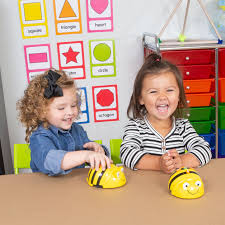Bringing Real-World Coding to Life: A Mini Grant Success Story
When Stephanie Thorla, a dedicated 1st and 2nd grade educator, submitted a mini grant request for $500, her passion for hands-on learning and real-world application of STEM concepts stood out immediately. Her project centers on teaching young students to use their imaginations and think critically by introducing them to the world of coding. Through a carefully designed unit, students learn to problem solve using basic code—laying the groundwork for important 21st-century skills.
A key component of her instruction involves Bee-Bots—small, programmable robots that make coding tangible for young learners. As class sizes continue to grow, Stephanie faced a challenge: with only five Bee-Bots available, students were limited in their opportunities to interact directly with the technology. With 27 to 28 students in each class, the ratio of one Bee-Bot per 5–6 students meant limited hands-on experience for each child.
Recognizing this clear instructional need, the Mt. Vernon Education Foundation was proud to fund Stephanie’s project through a $500 mini grant. The project not only supports STEM education but also ensures that students have more individual access to tools that foster creativity, analytical thinking, and real-world problem solving. The additional Bee-Bots will allow for smaller groups, increasing student engagement and giving each child more time to explore, test, and code on their own.
Seeing the potential impact of the project, the Foundation reached out to NineStar Connect, a long-time supporter of educational innovation. NineStar enthusiastically joined the effort, contributing an additional $250 to help make the project even more impactful. Their support underscores a shared commitment to investing in the future of our students and expanding access to high-quality, hands-on STEM learning.

Thanks to this partnership between the Foundation, a dedicated educator, and a generous community supporter, more students will have the opportunity to engage deeply with coding in ways that inspire, challenge, and empower them.
